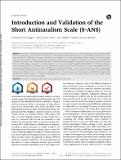Files in this item
Introduction and validation of the Short Antinatalism Scale (S-ANS)
Item metadata
| dc.contributor.author | Schönegger, Philipp | |
| dc.contributor.author | Maier, Maximilian | |
| dc.contributor.author | Bastos, Rafael Valdece Sousa | |
| dc.date.accessioned | 2023-03-15T17:30:05Z | |
| dc.date.available | 2023-03-15T17:30:05Z | |
| dc.date.issued | 2023-03-15 | |
| dc.identifier | 283099054 | |
| dc.identifier | 659e4c77-5ae0-49a9-ac4f-b7e5e808b67f | |
| dc.identifier | 85181929565 | |
| dc.identifier.citation | Schönegger , P , Maier , M & Bastos , R V S 2023 , ' Introduction and validation of the Short Antinatalism Scale (S-ANS) ' , Psychological Test Adaption and Development , vol. 4 , no. 1 , pp. 28-40 . https://doi.org/10.1027/2698-1866/a000036 | en |
| dc.identifier.issn | 2698-1866 | |
| dc.identifier.uri | https://hdl.handle.net/10023/27189 | |
| dc.description | Funding: This research was supported by a research grant from the Forethought Foundation and the Center for Effective Altruism. | en |
| dc.description.abstract | Antinatalism is the view that procreation is morally wrong. This paper introduces and validates the Short Antinatalism Scale (S-ANS) that allows researchers to measure antinatalist views. We conducted four preregistered studies with a total of 1,088 participants. First, we ran a study on Prolific (N = 296) and conducted an exploratory factor analysis of an initial scale including 22 items drawn from the philosophical literature on antinatalism. In Study 2, we conducted a confirmatory factor analysis of a reduced 12-item scale, also on Prolific (N = 396). Based on a Mokken scale analysis, we further reduced the scale to a 5-item version which we tested in a second confirmatory factor analysis, Study 3, on Prolific (N = 297), where we also aimed to provide evidence of validity. The results indicated excellent model fit (RMSEA = 0.012) and evidence for validity (with life satisfaction, affective empathy, and conservatism correlating negatively with antinatalism). Lastly, we conducted Study 4 with a sample of self-identified antinatalists on Reddit (N = 99) to provide additional evidence of validity. We find that the instrument is measurement invariant between self-described antinatalists and the general population and that antinatalists score significantly higher on the scale (d = 2.80). This provides evidence in favor of reliability and validity with respect to the final 5-item Short Antinatalism Scale (S-ANS). We hope that the S-ANS, which is freely available to all researchers, advances rigorous research into antinatalism and its determinants across a variety of fields that relate to the value of life and procreation. | |
| dc.format.extent | 13 | |
| dc.format.extent | 238292 | |
| dc.language.iso | eng | |
| dc.relation.ispartof | Psychological Test Adaption and Development | en |
| dc.subject | Antinatalism | en |
| dc.subject | Scale development | en |
| dc.subject | Personality | en |
| dc.subject | Empathy | en |
| dc.subject | Life satisfaction | en |
| dc.subject | BF Psychology | en |
| dc.subject | DAS | en |
| dc.subject | MCC | en |
| dc.subject | NIS | en |
| dc.subject.lcc | BF | en |
| dc.title | Introduction and validation of the Short Antinatalism Scale (S-ANS) | en |
| dc.type | Journal article | en |
| dc.contributor.institution | University of St Andrews. Philosophy | en |
| dc.identifier.doi | https://doi.org/10.1027/2698-1866/a000036 | |
| dc.description.status | Peer reviewed | en |
This item appears in the following Collection(s)
Items in the St Andrews Research Repository are protected by copyright, with all rights reserved, unless otherwise indicated.

